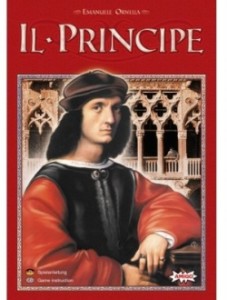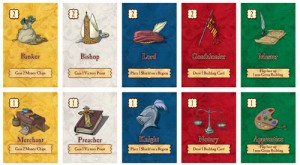Review: Il Principe
Posted by James (admin) on September 20th, 2010
 Il Principe is a difficult game to categorise as it involves card management, bidding, area control and role taking. However, rather than delivering a confusing mix of genres, it delivers a tight game which I really enjoyed.
Il Principe is a difficult game to categorise as it involves card management, bidding, area control and role taking. However, rather than delivering a confusing mix of genres, it delivers a tight game which I really enjoyed.
Players are building cities and institutions in Italy to earn victory points (VPs). At the start of each round, players receive 5 cash and 4 cards – the cards come in 5 colours each representing a different city institution (town hall, university, etc.). The players keep 2 cards and the rejected cards are combined and auctioned off colour-by-colour. After the auctions, a player can either (a) use cards and cash to build a city, or (b) place as many cards face-up in front of them of one colour showing control over the 5 different institutions.
There are 10 role cards (5 major & 5 minor in each colour). The player with the most face-up cards of each colour gets the matching-coloured major role uses the role’s benefit, e.g. the player with the most face-up green cards gets the Banker role card which earns them 2 extra cash. Earning the major role means half of the player’s matching colour face-up cards get turned face down. The person with the second-most cards of a colour gets the matching minor role which has the same benefit but doesn’t turn any cards face-down. When anyone builds a city, any players who have roles that match any of the card colours used to create the city receive VPs – 2VP for the major role owner and 1VP for the minor role owner. If a player has multiple roles, they points for all of their roles. So, not only do the roles give you a benefit, but they are also a good way to earn VPs too.
Building cities is a good way to earn points too plus the building player gets to place some of their coats-of-arms tokens in the city’s neighbouring regions (as there’s a small game board showing the cities and their neighbouring regions). At the end of the game, players with the most (and second most) coats of arms in each region score points. Plus there are extra points for sets of colour cards and most cash.
Overall, Il Principe is a very clever and very tight game. The tricky part is that you are very limited in the amount you can do each turn so you have to think carefully. You don’t have much money so must bid carefully especially because bidding to get cards to build cities may leave you with too little money to actually build the city itself. Also, owning roles is very important but only being able to place one colour of card(s) in front of you each round means your decision on what to place is critical, especially because you have to consider what cards other players have in front of them, what cards they may add to their face-up cards, which role you want to earn, which roles may earn the most VPs from city building. That’s a lot to think about – in a good way – and I always think it’s a good sign for a game when you’re not able to accomplish all that you want (although not by too much).
The extra points at the end of the game can make quite a difference too so there seem to be various routes you can use to maximise your score, although I think you still need to be involved with building cities and/or obtaining roles to score points from other peoples’ city building to stand a chance of winning. (So, I don’t think you can win via bonus points only which is how it should be.)
With all the bidding (as you also bid whenever there are ties for things too as well for cards) and with players racing to build the cities before others and fights over area control with their coats-of-arms, there’s a lot of player interaction. We found there were some very funny moments when bidding wars broke out and the groans when a player beat another to building a city, or managed to beat another to claim a role.
Released in 2005, Il Principe doesn’t feel like it has dated at all and still feels current. If the description of the game sounds a bit confusing then you’re not alone as it took us experienced players a couple of rounds before we settled in, but it’s actually quite straightforwards but has some interlinked game mechanics. Designed by Emanuele Ornella, who I interviewed last year, Il Principe was a thoroughly enjoyable game which plays quickly and requires clever thinking.
James.
[Played with 4 players]


